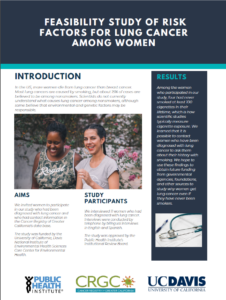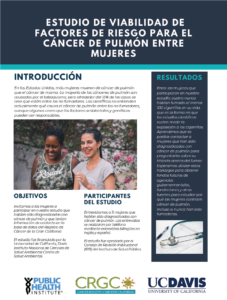CRGC researchers are engaged in a variety of surveillance and other research activities utilizing cancer registry data.
Current Studies
Tracking Health and Responses to Living with Cancer (THRIVE)
THRIVE is an ongoing collaborative study between Georgetown University, CRGC, and the New Jersey State Cancer Registry that aims to better understand the experiences and needs of those living with metastatic colorectal cancer (mCRC), helping to inform future survivorship care and support interventions. The study involves gathering information from a diverse cohort of adults recently diagnosed with mCRC in CRGC catchment areas or in New Jersey over a one-year period to explore aspects of their lives and healthcare that impact their symptoms, side effects, and quality of life. The CRGC research team is currently enrolling individuals newly diagnosed with mCRC from their catchment area to participate in this study. The study involves participation in up to four surveys over a 12-month period. For more information about THRIVE, visit our website at thrivestudy.georgetown.edu or contact us at: thrive@crgc-cancer.org.
Research of Prostate Cancer in Men of African Ancestry: Defining the Roles of Genetics, Immunity and Social Stress (RESPOND)
RESPOND is a large, multi-state, cohort study that aims to uncover the social and biological factors that are related to prostate cancer aggressiveness in African American men. African American men are more likely to develop prostate cancer than any other racial or ethnic group and twice as likely as non-Hispanic White men to die from the disease. Yet, prior studies addressing these disparities are limited.
CRGC, along with other sites across the United States, recruited over 12,500 African American men diagnosed with prostate cancer between 2015 and 2020. Participants completed a questionnaire, with some providing a saliva sample and allowing researchers access to their tumor tissue to study how exposure to stress over a lifetime, inherited susceptibility (i.e. genes), and tumor characteristics contribute to the development of prostate cancer and aggressive disease.
The RESPOND research team is preparing to conduct a follow-up survey with prior RESPOND participants over the next couple of years to update comorbidities, lifestyle behaviors, experience of stress, access to care, and neighborhood environmental data, and to collect outcome information, including prostate cancer progression/recurrence and mortality.
Additionally, the RESPOND team plans to recruit family members of current RESPOND participants to study genetic factors that may contribute to prostate cancer in African American men and assess knowledge and beliefs surrounding prostate cancer risk, genetic testing, and family health communication.
The information gathered from the RESPOND studies will improve understanding of multilevel factors that contribute to prostate cancer disparities and address challenges in the prevention, diagnosis, and care management of prostate cancer among African American men.
For more information about RESPOND, visit http://www.respondstudy.org/.
Air Pollution and Neighborhood Stressors as Determinants of Non-Small Cell Lung Cancer (NSCLC) Mutation Patterns and Recurrence
NSCLC is the leading cause of cancer-related death in the United States and, despite smoking less, non-Hispanic Black/African Americans are diagnosed younger and have less favorable outcomes. Evidence suggests that these disparities may be linked to socioenvironmental factors, including exposure to air pollution and neighborhood-level stressors.
This study, in partnership with the City of Hope, will include 300 patients with state I-II NSCLC from California, Georgia, and Detroit, and aims to identify relationships between exposure and mutations, assess how exposures influence early recurrence (within 2 years of surgery), and compare the tumor genomes of patients that never smoked with the national Sherlock-Lung study to evaluate the effect of environmental stressors. The research will give insights into the connections between external factors and NSCLC biology and outcomes and may inform risk and strategies for prevention and early detection in individuals that experience higher environmental exposures.
The City of Hope team is currently enrolling eligible participants from CRGC’s catchment areas. CRGC will be obtaining NSCLC tumor tissue samples of consenting study participants from the facilities that provided diagnosis and/or treatment and sharing the deidentified samples with the study team. The study team will examine the tissue samples for tumor evolution patterns and unique mutational signatures and then return the samples to the corresponding facilities.
Past Studies
Patterns of Care (POC)
The National Cancer Institute (NCI) implemented the Patterns of Care (POC) studies in 1988 in response to a congressional mandate to report on the dissemination of state-of-the-art therapy into the community. Once a year, the NCI selects different cancer sites to study and utilizes their Surveillance, Epidemiology, and End Results (SEER) cancer registry program to collect additional diagnostic and treatment information from the populations covered by each of the registries, including the CRGC. The study aims to evaluate the diffusion of state-of-the-art therapies and diagnostics into oncology practice, identify multilevel factors that affect the receipt and use of cancer care, and communicate the findings through presentations and publications.
The CRGC began participating in SEER POC studies in 2000. The CRGC staff randomly select an agreed upon number of patients diagnosed with the selected cancer types in the CRGC catchment area for each study period and contact their medical providers to verify The most recent SEER POC study was conducted in 2024-2025 on ovarian and prostate cancer for diagnosis year 2021. More details about this study, its history, and publication lists can be found at: https://healthcaredelivery.cancer.gov/poc/
Feasibility Study on Environmental Risk Factors for Lung Cancer Among Hispanic/Latina Women in California:
CRGC conducted a feasibility study aimed at identifying environmental risk factors for never smoker Hispanic women with adenocarcinoma of the lung in California. Risk of lung cancer among never smokers is not well understood and prior studies of this topic have produced conflicting results. Adding to these challenges is the difficult task of identifying a large group of lung cancer patients who are never smokers, particularly because cancer registries do not consistently collect smoking history. The purpose of this pilot project was to assess the feasibility of using the cancer registry to identify lung cancer patients who are likely to be never smokers, and to assess the feasibility of using a telephone interview to identify these patients’ exposure to environmental risk factors. A secondary aim for this study was to determine the feasibility of using registry data to identify and interview recently diagnosed cancer patients.
Lung Cancer Newsletter – English Version:
Lung Cancer Newsletter – Spanish Version:
VTR (Virtual Tissue Repository) Pilot Study:
CRGC participated in the SEER Virtual Tissue Repository (VTR) study from 2015-2021. The aim of this study was to identify best practices for a scaled virtual biorepository to support contemporary cancer research questions. Biospecimen collection is becoming increasingly important in cancer research, especially with advances in screening and treatment. The aim of this study was to utilize the registry as a resource for organizing the collection of biospecimens in an efficient and confidential manner. This initial pilot focused on two important clinical outcomes representing extreme survivors: (1) breast cancer patients with localized node-negative disease who died within 2 years of diagnosis, and (2) long-term (> 5 years) survivors of pancreatic adenocarcinoma. CRGC acted as an intermediary between the researchers and the biospecimens, providing access to deidentified tissue for researchers as well as detailed annotations for each cancer case. For findings from this study, see https://doi.org/10.1093/jncimonographs/lgae034 .
Health-Related Quality of Life in Older Women with Gynecologic Cancer: A Population-Based Analysis Using the Surveillance, Epidemiology, and End Results – Medicare Health Outcomes Survey (SEER-MHOS)
Cancer patients often experience significant physical and mental problems that negatively impact their health-related quality of life (HRQOL). While HRQOL is becoming an increasingly important part of cancer research, relatively little is known about HRQOL in older women with gynecologic cancers. CRGC sought to investigate HRQOL in these women using the SEER-MHOS data resource, which links cancer data from the SEER program of population-based cancer registries with data from the Medicare Health Outcomes Survey (MHOS) of Medicare Advantage Organization enrollees. This project had three main objectives: 1) to assess the impact of depressive symptoms on HRQOL in older women with gynecologic cancer, 2) to evaluate pre- to post-diagnosis changes in HRQOL in older women with gynecologic cancer, and 3) to examine the association of HRQOL measured before cancer diagnosis with survival in older women with endometrial cancer. Together, these studies provide evidence of the significant impact that gynecologic cancer has on both physical and mental aspects of HRQOL, demonstrate the value of patient-reported outcomes in cancer research, and underscore the need for tailored interventions to reduce pain and provide support for older women with gynecologic cancer. For findings from this study, see https://doi.org/10.1016/j.jgo.2019.10.001
Validation of Patient Reported Outcomes Measurement Information System (PROMIS) in Diverse Cancer Populations
CRGC researchers, in collaboration with Georgetown University and three other Surveillance Epidemiology and End Results (SEER) regions, used cancer registry data to evaluate the usefulness of PROs (patient reported outcomes) among diverse cancer patient populations. Surveys of approximately 4,000 cancer patients in the Greater California regions were conducted for this study and treatment information has been abstracted from a sample of their medical records. For findings from this study, see https://doi.org/10.1200/JCO.2016.71.4410
Adolescent and Young Adult Experience of Care
This study was designed to help us understand how best to obtain consent, collect medical records, and survey a population-based sample of recently diagnosed adolescent and young adult (AYA) cancer patients. Surveys aimed to address these AYA cancer patients’ experiences with cancer and cancer care. This study was a collaborative effort conducted at multiple Surveillance, Epidemiology and End Results (SEER) regional registries, including CRGC, with an overall goal of enrolling 530 AYA patients aged 15 to 39 years at time of diagnosis. The Cancer Registry of Greater California (CRGC) aimed to enroll a total of 70 patients. Cancer sites included were: acute lymphoblastic leukemia, germ cell tumors, Hodgkin’s and non-Hodgkin’s lymphoma, and sarcomas – including osteosarcoma, Ewing’s sarcoma, and rhabdomyosarcoma.


